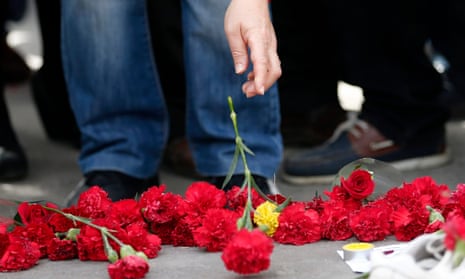On a minibus in Ankara, a young woman sits down and bursts into tears. Other passengers comfort her wordlessly, knowing the reason. The bus passes high street shops with black ribbons displayed in the windows among colourful adverts. Near the blood-streaked bomb site, a line of carnations has been placed neatly outside the police cordon. But alongside this mute grief, people are angry – not with nameless terrorists, but with a cowardly government.
As Turks nationwide grieve for the victims of Saturday’s bombings, the predictably ugly blame game has begun. Newspaper headlines scream their various accusations, (rightly) ignoring a ban on reporting on the subject, and government ministers tie themselves in knots pointing fingers. It was a collaboration between the Kurdish militant group the PKK and Islamic State, says the EU minister, Beril Dedeoğlu, clutching desperately at mutually exclusive straws. There was no breach in security, insists the interior minister, Selami Altınok, dismissing outright a journalist’s question of whether he might resign in the wake of 100 dead. This isn’t a Justice and Development party (AKP) government, bleats the prime minister, Ahmet Davutoglu, hiding behind an “interim” government composed entirely of AKP members and bureaucrats as he approaches the country’s second general election in five months.
I won’t list all the ridiculous claims that have come from government sources and pro-government media – none of them matter. Those who choose to believe the line that Kurdish and Islamist militants carried out the attacks in cahoots do not need a nuanced argument to convince them, and those who do not believe a word the government says were expecting this response anyway. Of course, people want answers. They want resignations. Today, several trade unions went on strike, and students and teachers are boycotting schools in protest. But deep down, most people know they won’t get what they’re demanding. Despite this, the angry youth that might have responded violently to the attacks have not done so. This is something for Turks to be incredibly proud of, regardless of political consequences. It bodes well for the Peoples’ Democratic party (HDP), which is now seen as the umbrella group for the leftists who were marching, and which has served as a beacon of hope for those who hope for peace with the country’s Kurds.
I attended a funeral for the victims on Sunday. It was like an eerie replay of Saturday’s gathering – the same people marching side by side, the same slogans, the same determination for peace. Many of the people there knew the victims personally. They were shattered and angry, calling Recep Tayyip Erdoğan a murderer, absolutely convinced that the attacks were orchestrated by – or at the very least carried out with the knowledge of – the state in an attempt to intimidate HDP voters and sow panic before November’s elections. And yet, among the cries of anger were also cries for peace.
We saw the same thing during the Gezi Park protests in 2013, when the few teenage boys throwing stones at water cannons were stopped by other protesters, who at one point formed a human shield around riot police. On Saturday, when protesters attacked police who prevented them from going to lay carnations at the scene, other mourners with clearer heads stepped between them. Two days before the general elections in June, there was a bomb attack on a rally organised by the HDP in the eastern city of Diyarbakir. The party’s co-chair, Selahattin Demirtaş, was due to speak in a few minutes when the bombs went off. As survivors reeled from the shock, Demirtaş called for calm. “We must hold out for peace,” he said. “Peace, despite everything.” He said the same thing yesterday in Ankara, and the other speakers who took up the microphone after him repeated the message. “You must promise!” said one man, addressing a crowd gathered at the cemetery. “We promise!” roared the crowd in response, raising their fists.
Demirtaş and the HDP followers know that any violent response will be jumped on as “proof” of the dangerous nature of the party’s support base, which is in large part formed of the country’s Kurds, as well as other minorities. Even before the June elections, members of the AKP had started accusing the HDP of acting “under the tutelage” of the outlawed PKK. Despite this smear campaign, the party gathered enough support to pass the 10% election threshold to enter parliament, resulting in a hung parliament.
This time round, the stakes are higher. War has been raging in the south-east of the country between Turkish troops and the PKK since July. Many voters are scared of instability, and will be voting to avoid another hung parliament. Whatever the results of the elections on November 1, the peaceful reaction of those directly affected by Saturday’s attacks gives us hope for the future of Turkey.
